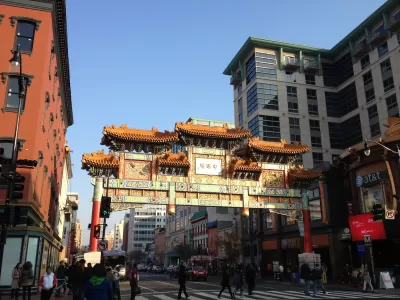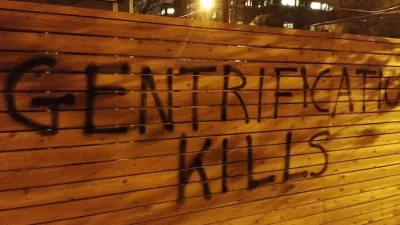Can a neighborhood still call itself Chinatown when everyone living there is wealthy and white? Beset by rapid gentrification, longtime residents of D.C.'s Chinatown fight to keep their homes.

Expensive new condos loom over Chinatown's Friendship Archway in Washington D.C. Amid such vigorous gentrification, residents worry as "an ethnic enclave of mom-and-pop storefronts [will] be transformed into a kitschy block where Chipotle is written in Chinese characters — and luxury condos and glittering nightspots."
For the Washington Post, Yanan Wang writes about ongoing displacement. "It was about a year ago that residents of [Jenny] Tang's apartment complex, Museum Square, received demolition notices. The building houses roughly half of Chinatown's remaining Chinese community, and although many could not read what was written in the English-language letters from the building's owner, their African American neighbors helped them to understand: the building's Section 8 contract was due to expire, and the owner planned to demolish their tawny home to make way for a new development."
"'Rich people would never have lived here before, but we've set down our roots,” [resident Jianhong Wang] says. 'Now that circumstances are better, they're trying to buy everything.'" [...] Resident Tie-Sheng Dai writes, "'Our vision of the country has been disrupted by a greedy owner who hasn't lived here a single day.'"
There are some willing to defend the beleaguered residents. "The D.C. Council passed emergency legislation in March to protect residents from Bush's high asking price." Non-Chinese community leaders have also come forward. Bush Companies is asking $800,000 per apartment.
FULL STORY: D.C.’s Chinatown has only 300 Chinese Americans left, and they’re fighting to stay

Planetizen Federal Action Tracker
A weekly monitor of how Trump’s orders and actions are impacting planners and planning in America.

San Francisco's School District Spent $105M To Build Affordable Housing for Teachers — And That's Just the Beginning
SFUSD joins a growing list of school districts using their land holdings to address housing affordability challenges faced by their own employees.

The Tiny, Adorable $7,000 Car Turning Japan Onto EVs
The single seat Mibot charges from a regular plug as quickly as an iPad, and is about half the price of an average EV.

As Trump Phases Out FEMA, Is It Time to Flee the Floodplains?
With less federal funding available for disaster relief efforts, the need to relocate at-risk communities is more urgent than ever.

With Protected Lanes, 460% More People Commute by Bike
For those needing more ammo, more data proving what we already knew is here.

In More Metros Than You’d Think, Suburbs are Now More Expensive Than the City
If you're moving to the burbs to save on square footage, data shows you should think again.
Urban Design for Planners 1: Software Tools
This six-course series explores essential urban design concepts using open source software and equips planners with the tools they need to participate fully in the urban design process.
Planning for Universal Design
Learn the tools for implementing Universal Design in planning regulations.
Smith Gee Studio
City of Charlotte
City of Camden Redevelopment Agency
City of Astoria
Transportation Research & Education Center (TREC) at Portland State University
US High Speed Rail Association
City of Camden Redevelopment Agency
Municipality of Princeton (NJ)





























